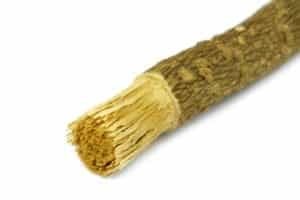 When you think of your teeth and oral health you probably think of a toothbrush, toothpaste, dental floss, mouthwash, and your dentist. Chances are your thoughts do not include trees! Have you ever wondered what people used to maintain their oral health before the invention of toothbrushes and dentists? Trees! Trees played an important part in the maintenance of oral health, two specific trees: the toothbrush tree and the toothache tree. Our discussion today will focus on the toothbrush tree.
When you think of your teeth and oral health you probably think of a toothbrush, toothpaste, dental floss, mouthwash, and your dentist. Chances are your thoughts do not include trees! Have you ever wondered what people used to maintain their oral health before the invention of toothbrushes and dentists? Trees! Trees played an important part in the maintenance of oral health, two specific trees: the toothbrush tree and the toothache tree. Our discussion today will focus on the toothbrush tree.
What is the Toothbrush Tree?
People have been cleaning their teeth since the beginning of humanity, but how did they do it? Well, we know that in Africa and the Middle East they would use the toothbrush tree. What is the toothbrush tree? It is a tree that is still popular today, the arak tree, or Salvadora persica.
Say What?
Say tree! It is the root of the arak tree that they would use to brush their teeth. The root has natural antiseptic and astringent properties, and although said to be bitter in taste, it not only can clean and protect your teeth and gums, it leaves your breath smelling sweet. What’s great about this natural toothbrush, called the miswak, is that it can be used over and over.
How it’s Used
Before using the miswak, the root must be soaked in water for a few hours. This softens the natural fibers. After scraping off up to ½ inch of bark from the tip of the root, chew on that area until the fibers separate and appear more like the bristles of a toothbrush. To brush your teeth, simply rub the miswak in up and down or circular motions over your teeth and gums the same as if you were using a traditional toothbrush. Once it becomes overused, there is no need to run out and buy another toothbrush (or find another root) because you can cut off the used tip and repeat the process all over again.
Interesting Fact: Interested in purchasing a miswak? They are sold by the Pakistan-based company Al-Khair, and are also still sold by street vendors in the Middle East.

